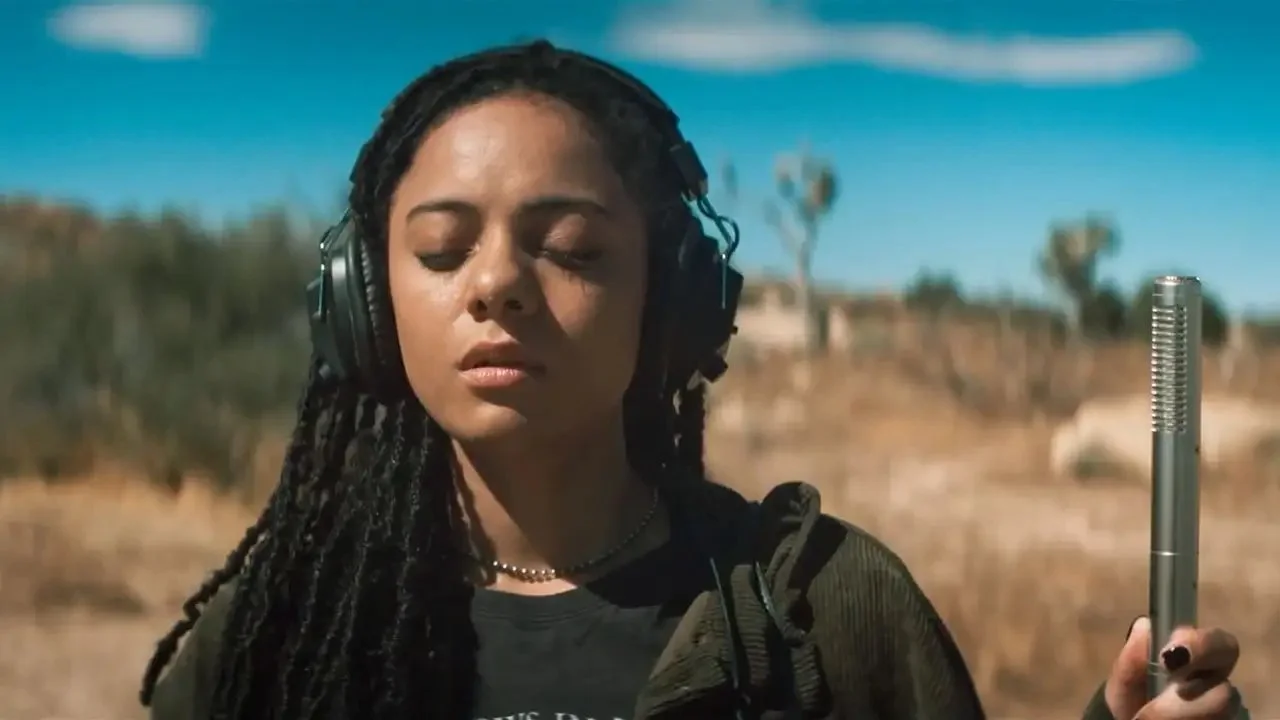Speaking with Aleyse Shannon feels a bit like watching a great performer switch instinctively between instruments. She listens with intention, answers with care, and carries a presence that’s both grounded and quietly electric. After talking with her, I walked away even more excited about Decibel, the new sci-fi thriller from director Zac Locke, and now more curious than ever about revisiting Black Christmas during the upcoming holiday season.
Chroma released Decibel on Apple TV and Fandango November 7, followed by an SVOD debut on Prime Video December 1. The film stars Shannon alongside Stefanie Estes and Colby Groves and follows Scout, a struggling singer-songwriter offered a life-changing opportunity by a tech-obsessed music producer. What begins as an artistic collaboration becomes a tightening web of control as Scout is pushed to help design a perfect AI-generated music algorithm.
Beyond its clever sci-fi hook, Decibel has already earned praise for its sound. It features original music by Caitlin Scholl with production by Groves and won the Best Sound Award at FilmQuest. A key part of that authenticity comes from Shannon herself, who performed all her vocals live on set.
“It kept me very sensitive. It kept me very honest,” she told me. “I am not a trained singer by any means. They said they might re-record it and we never did. A lot of that is raw. Very raw. But I like it. It is charming in hindsight.”
Finding Scout: Curiosity, Time, and the Feeling of Being a Little Out of Place
The role of Scout clicked with Shannon immediately. “The first thing that jumped off the page about Scout was the name,” she said. “Any time a girl is named Scout, we all think a little To Kill a Mockingbird moment. She is inquisitive, very independent, and authentic.”
What truly grounded her, though, was the understanding of how musicians live in their own internal clock. “The time it takes to learn to play an instrument. The time it takes to learn an interface. You build your own world and get obsessed with it. I have spent those hours building calluses. That was my first way in.”
Shannon relates deeply to Scout’s quiet resourcefulness, that sense of a person who may appear calm but is absorbing everything around her. “How much can I say about someone who feels like a fish out of water everywhere she goes?” she wondered. That quality becomes the emotional engine of the film.
Capturing Music as Human Imperfection
One of the film’s standout elements is watching Scout compose in real time, turning the world into music. Shannon prepared for that intuitive, tactile musicianship in a hands-on way.
She and co-star Colby Groves sent each other voice notes, writing and shaping songs together. “I had to listen to what he was doing and figure out the vibe of a progression or where we could take it,” she said.
Shooting in the desert and on a fast-paced indie schedule meant surrendering to the moment. “We were running and gunning. I do not think I could have physically prepared for that. The guitar hunch is always a thing. You are bent over the instrument, taking in the elements around you.”
Performing live amplified the emotional tension of the story. Vulnerability is built into the sound. “When you are pressed, you plant your feet, open your mouth, and sing. It is very vulnerable. But it kept me connected to Colby and everyone making the music.”
Art vs. Algorithm: The Human Line in the Age of AI
Decibel explores the collision between creativity and algorithmic control, a topic Shannon thinks about often.
“In any artistic industry there will be waves of technology people push back on,” she said, recalling how autotune was once treated as sacrilege before becoming a creative tool.
But the rise of AI feels different. “Right now there is a brazen attempt to get everybody to love and sign their rights away to AI. We cannot. But I cannot wait for the fast forward where it actually settles into society and is helpful.”
For Shannon, the irreplaceable part of performance is its imperfection. “The thing I find charming about Scout is vulnerability. You cannot get that with AI. What are you going to do, program a computer to be sharp on a note? It does not make sense.”
That belief resonates throughout the film, which treats every sound as evidence of a human artist breathing behind the waveform.
A Collaboration That Feels Like a Duel
Much of the film’s emotional charge comes from Shannon’s chemistry with Stefanie Estes, whose character becomes both mentor and threat.
“Stephanie is so stone cold the second she locks in. I am like whoa girl, what happened,” Shannon laughed. “But she is the most opposite person from her character. She is sweet and tender. She brought cookies to set because she thought it would be nice.”
That warmth created the trust needed for the film’s power struggle. “We bonded. We were like dorm room neighbors. We are both honest and supportive. After that, it was easy.”
Black Christmas, Strong Women, and Characters Who Fight Quietly
Though Decibel is a very different film from Black Christmas, Shannon sees a meaningful thread in the types of characters she is drawn to.
“I get cast this way a lot. People tell me I have a strong presence. I think I am blunt and not scared of a whole bunch. Scout has that same moment of ‘What are you doing’ where she stands up for herself.”
Shannon is especially interested in watching strong characters pushed to their limits. “It is more interesting to see someone strong go through something that makes them not feel strong. That happened to Chris in Black Christmas. It happens to Scout. Human problems happen to everyone.”
Her north star as an actor is simple. “I promise to care about what the character cares about. Music, math, a child, boxing, whatever it is. The strength is a byproduct of that.”
A Rising Star with Voice and Vision
By the end of our conversation, it was clear why Shannon’s performances feel so lived-in. She leads with openness. She listens harder than most people speak. And she is fearless about bringing her raw, unpolished humanity to roles that ask for it.
Decibel might be a film about technology shaping art, but Shannon’s presence makes it unmistakably human.
When our interview wrapped, she left me with the same warmth she carried throughout.
“This was a great interview,” she said. “I appreciate your time.”
The feeling was mutual. Aleyse Shannon is the kind of performer you want to follow, not just for the roles she takes, but for the sense of self she carries into the work. If Decibel is any indication, her star is only going to rise from here.
Jessie Hobson





